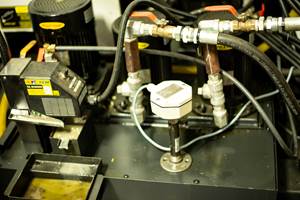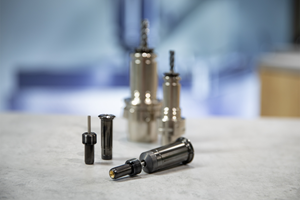A New Approach To Critical Fluid Maintenance
Today, viscosity can be measured precisely by a sensor device that is immersed directly under a stream of fluid or mounted in the fluid tank or pipeline. In simplified terms, the sensor uses sound waves that lose energy when emitted along surfaces of a quartz crystal in contact with the fluid.
Machine tools and other production equipment rely on the quality of various fluids to maintain optimum performance. Lubricants in gearboxes, fluids in hydraulic systems and coolants used to flood the work zone or cool machine components provide essential functions. They reduce friction and control thermal effects, for example. If these fluids are allowed to deteriorate or become contaminated, then the machine’s ability to produce acceptable workpieces is jeopardized. The machine may not be able to hold tolerances or meet production goals because of unplanned downtime.
New sensor technology is making it possible to monitor one of the key properties of a fluid and to detect early warning signs that the fluid may no longer meet requirements. This sensor technology automatically measures the viscosity of industrial fluids. Because viscosity is linked to fluid performance and because changes in viscosity are symptomatic of many negative conditions, monitoring this property is proving to be an effective diagnostic tool. Preventive maintenance activities can be targeted to true root causes, and the results of these activities can be verified.
In the past, viscosity (a measure of a fluid’s resistance to flow) was difficult to measure quickly, accurately and in a digital format. As a result, other properties have been monitored instead. Shops checked color, transparency, acidity or even odor, but the results were not always reliable or scientific. Today, viscosity can be measured precisely by a sensor device that is immersed directly under a stream of fluid or mounted in the fluid tank or pipeline. In simplified terms, the sensor uses sound waves that lose energy when emitted along surfaces of a quartz crystal in contact with the fluid. This energy loss is proportional to the viscosity of the fluid. Thicker fluids draw off more energy than thinner fluids, so to speak. Measuring the change in energy gives highly accurate viscosity readings through a range of temperatures.
The ViSmart from BiODE Inc. (Westbrook, Maine) is such an acoustic sensor. It is smaller than a matchbox. Onboard electronics control sensor operation while communicating with an external display unit. The sensor lies in contact with or under the surface of the fluid with a cable attached to the display unit. The company offers a handheld display unit that can be connected to the cable for monitoring by a machine operator or for data collection and downloading. The display unit can be left in place or carried from machine to machine for connection to sensors in each location.
Kerem Durdag, BiODE CEO, reports that several customers are using his company’s sensor to monitor lube oils in gearboxes on production equipment as well as to monitor coolant in machine tools. For now, these applications tend to be in higher-volume production facilities because preventive maintenance is a high priority in places where the consequences of production equipment malfunctions or process instability are drastic. However, as smaller plants and job shops become more disciplined about preventive maintenance and move to more automated production, Mr. Durdag expects these users to seek sensor-based technology for monitoring the condition of critical fluids.
Related Content
Managing Coolant with Skimmers, Refractometers and More
Bacteria-infected coolant harms machines and sickens machinists. Coolant management technologies like skimmers and automated systems counter this tendency.
Read MoreRego-Fix Toolholding System Reduces Coolant Consumption
MQL PG collets are designed for machines using one-channel, internal through-spindle MQL systems.
Read MoreSTLE To Host Metalworking Fluid Management Program
STLE’s program is a two-and-a-half-day education program offering a comprehensive overview of metalworking fluid management.
Read MoreNew Coolant Designed for Automotive Parts Production
Choosing the right coolant is critical for productivity, economic efficiency and machining quality.
Read MoreRead Next
Registration Now Open for the Precision Machining Technology Show (PMTS) 2025
The precision machining industry’s premier event returns to Cleveland, OH, April 1-3.
Read MoreThe Future of High Feed Milling in Modern Manufacturing
Achieve higher metal removal rates and enhanced predictability with ISCAR’s advanced high-feed milling tools — optimized for today’s competitive global market.
Read More5 Rules of Thumb for Buying CNC Machine Tools
Use these tips to carefully plan your machine tool purchases and to avoid regretting your decision later.
Read More

























